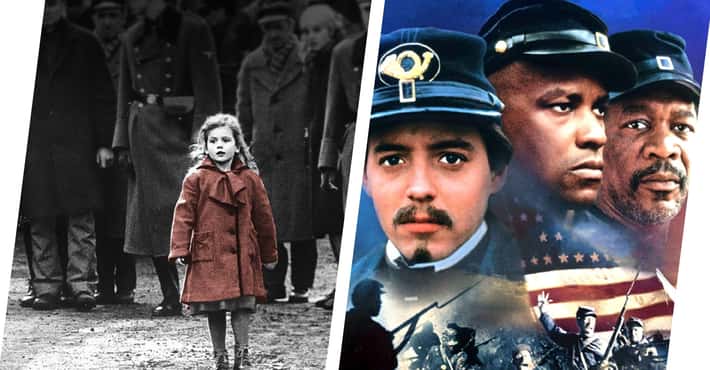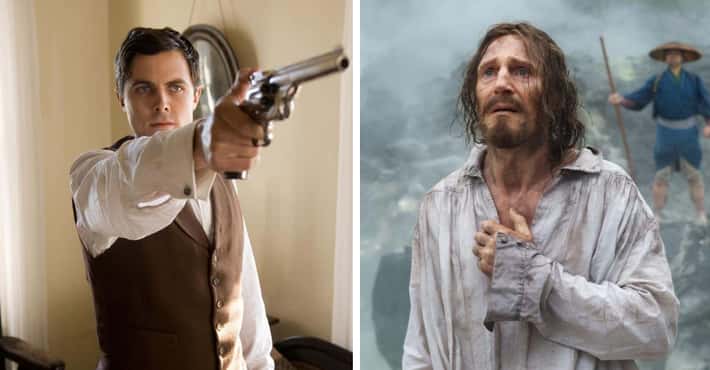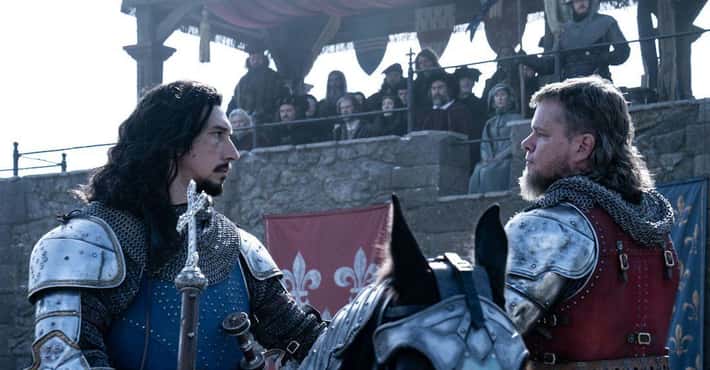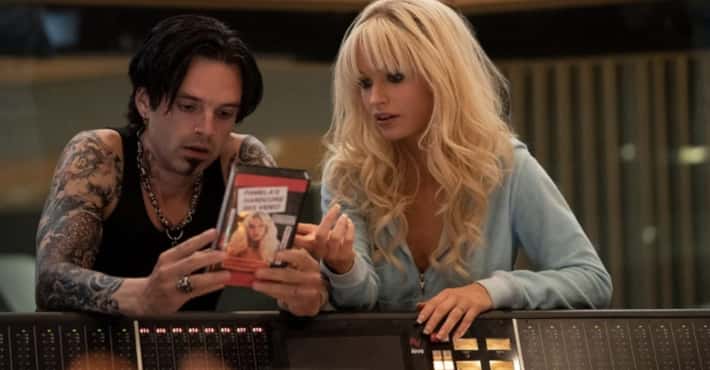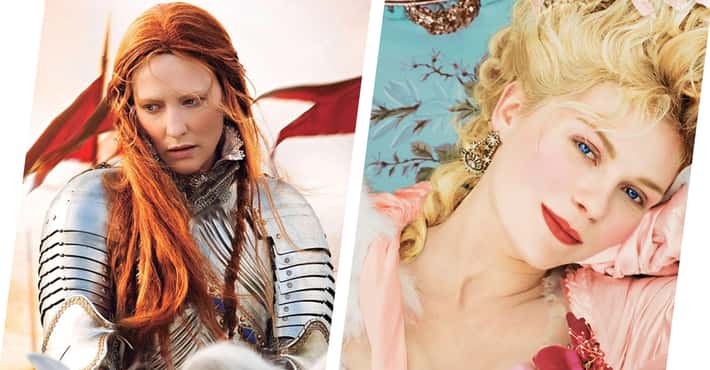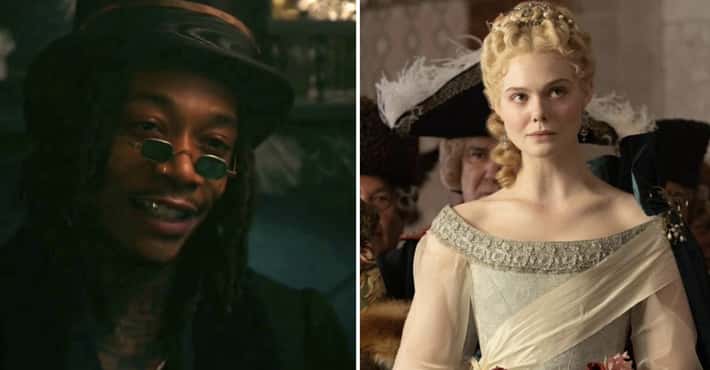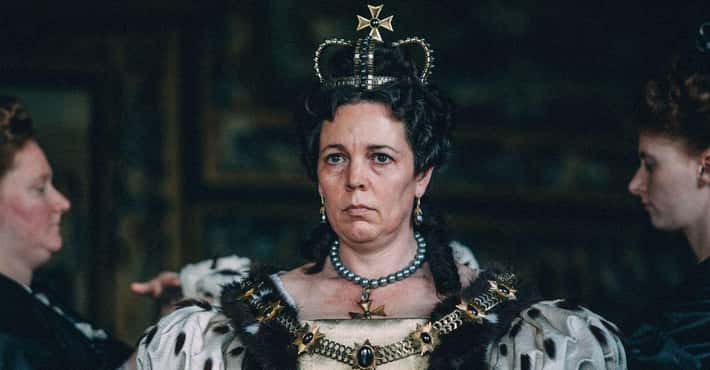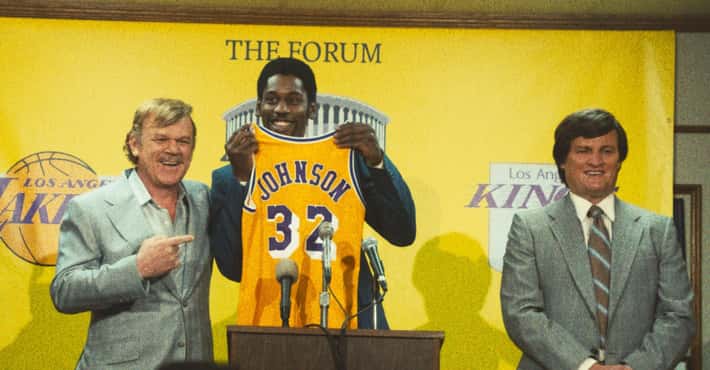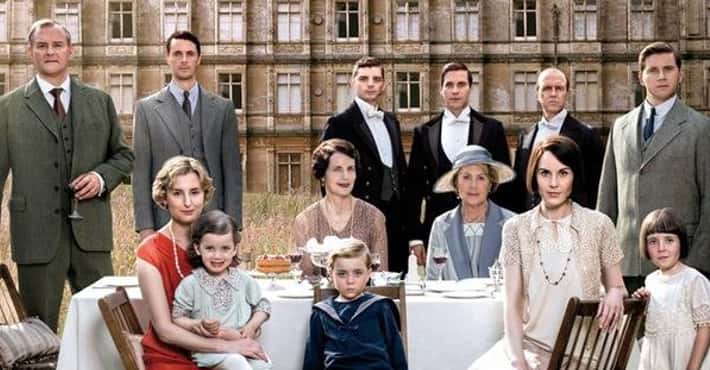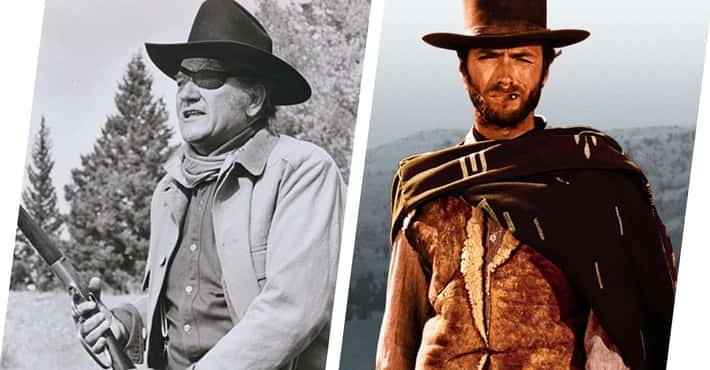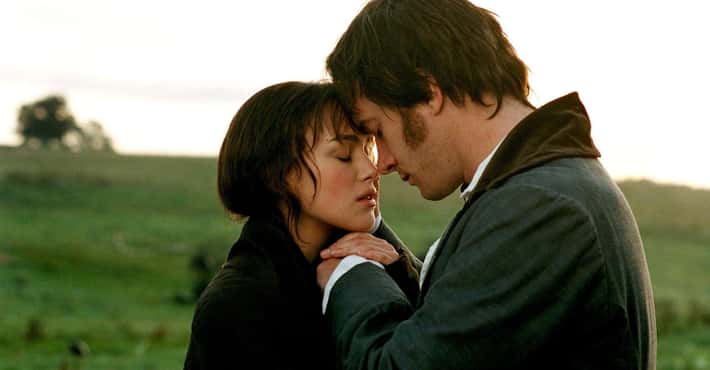
Every Period Drama Starring Emily Blunt That'll Transport You To Another Time
Vote up the period dramas that Emily Blunt shines the most in.
Emily Blunt has stunned audiences for more than two decades with her incredible acting talent. She is a versatile actress with an impressive series of theater and musical performances under her belt, as well as memorable roles in romantic comedies like The Devil Wears Prada, thrillers like The Girl on the Train, and horror films like the Quiet Place franchise.
While these movies showcase her acting range and have earned her some prestigious awards, period dramas are where this radiant actress really shines. Emily Blunt has been featured in a wide range of period dramas, from the young and impressionable British queen in The Young Victoria to a tough aristocrat battling her way across the untamed American West in search of revenge in The English. Regardless of the period being portrayed, the costumes, or the scenery, Emily Blunt is guaranteed to deliver some truly dynamic performances that will transport you to another time.
- 111 VOTES
Mary Poppins Returns
The Period: England, mid-1930s
The Role: Set approximately 20 years after the first film, Mary Poppins returns to the home of Jane (Emily Mortimer) and Michael Banks (Ben Wishaw) after Michael’s wife dies. She takes charge of his three children and whisks them away on whimsical adventures while Jane and Michael attempt to locate bank shares that will help him maintain ownership of their family home.
Why Emily Shines: Emily Blunt’s performance in this delightful sequel was universally praised by critics and moviegoers alike. She portrayed Mary Poppins with a sharp but kind efficiency, honoring the original performance given by Julie Andrews while lending her signature charm and lovely singing voice to the character. She received a Golden Globe nomination for best performance by an actress in a motion picture - musical or comedy and a Critics Choice Award nomination for best actress.
More Mary Poppins Returns- #117 of 204 onMusical Movies With The Best Songs
- #91 of 155 onThe 150+ Best Classic Tween Movies
- #192 of 232 onThe Best Movies For Women
- 212 VOTESPhoto: Momentum Pictures
The Period: England, Mid-to-Late 1830s
The Role: Set in the early years of Queen Victoria’s life and reign, The Young Victoria is a period drama that examines the woman behind the crown. The film follows Victoria’s unexpected rise to power at only 18 years old, her desire for control over her own destiny, and her eagerness for companionship after a life of relative loneliness. The majority of the plot centers around her fated romance with Prince Albert (Rupert Friend) and the start of their life together, but it also examines her dedication to being a knowledgeable and effective monarch.
Why Emily Shines: Emily brings life and color to the revered symbol that is Queen Victoria, illustrating her insecurity and inexperience as a young monarch alongside her intelligence and strength throughout the film. Her performance feels authentic, both for the time period and the woman she skillfully embodies. Although the movie maintains a slow, tension-free pace where not much happens, Emily’s portrayal of the queen’s daily life and struggles make for a captivating watch.
More The Young Victoria- #5 of 80 onThe Best Period Romance Movies
- #14 of 79 onGreat Period Movies Set in the 19th Century
- #3 of 25 onGreat Movies About Real Female Rulers
- 311 VOTESPhoto: Amazon Studios
The Period: American West, 1890
The Role: Englishwoman Lady Cornelia Locke (Emily Blunt) journeys through the American Wild West in search of the man responsible for the untimely death of her son. In her bloodthirsty hunt for revenge, she teams up with Sergeant Eli Whipp (Chaske Spencer), an ex-cavalry scout and ‘former’ member of the Pawnee Nation. Together they travel through the western territories in search of their own goals, forging a lasting and intimate friendship along the way.
Why Emily Shines: Emily’s portrayal of an aristocratic woman seeking revenge in a harsh, violent, and foreign land is sensational. She plays Lady Locke with a strength, humor, and unexpected penchant for violence one might initially assume a well-bred woman of the late 1800’s would not possess. She also beautifully portrays the character’s capacity for tenderness and respect, in spite of all that has happened to her, in her on-screen relationship with Eli. These touching and quiet moments balance out some of the darker themes infused into each episode.
More The English- #110 of 685 onThe 600+ Best TV Shows Of The Last 5 Years
- #123 of 1,054 onThe 250+ Best Streaming Shows Of The Last Few Years
- #324 of 654 onThe 500+ Best Drama Shows
- 416 VOTES
The Strange Case of Sherlock Holmes and Arthur Conan Doyle
Photo: BBCThe Period: England, 1892-1899
The Role: Sir Arthur Conan Doyle (Douglas Henshall), the author of the Sherlock Holmes detective novels, has recently killed off his famous character to pursue other writing endeavors. He agrees to be interviewed by a biographer named Selden (Tim McInnerny) while taking care of his sick wife and fighting his growing feelings for fellow spiritualist Jean Leckie (Emily Blunt).
Why Emily Shines: The TV movie received mixed reviews when it was released in 2005, but it can’t be denied that Emily Blunt’s performance as the charming and intriguing Jean Leckie is delightful. Her on-screen chemistry with Henshall is palpable and grounds the more fantastical elements of this semi-biographical tale.
- 54 VOTESPhoto: Universal Pictures
The Period: England, 1891
The Role: Lawrence Talbot (Benicio del Toro) returns to England after his brother’s mysterious and grisly murder. Upon arrival, he is introduced to his brother’s grieving widow Gwen (Emily Blunt) and is forced to confront his estranged father (Anthony Hopkins). His attempt to hunt down the beast that killed his brother results in him getting bit and cursed by a werewolf. Amidst her grief for her husband's violent death, Gwen finds herself drawn to Lawrence and is determined to help him break the curse.
Why Emily Shines: Emily succeeds in taking a shallow, damsel-in-distress role and elevating it to a must-see performance. She portrays the grieving Gwen as a heroine that is smart, put together, and full of heart. Her genuine personality is necessary to ground the more unbelievable parts of the film and create a believable relationship with Lawrence so soon after her husband's demise.
More The Wolfman- #104 of 114 on50+ Movies That Need Sequels
- #43 of 64 onThe Best Horror Movie Remakes Of All Time
- #29 of 71 onThe Scariest Animal Horror Movies Ever Made
- 67 VOTESPhoto: ABC
The Period: Rome, 44 BCE
The Role: A priestess named Camane (Emily Blunt) has a disturbing vision of Julius Caesar’s murder. Although she warns him of his future, Caesar dies at the hands of his senate, setting into motion a deadly battle for power between his nephew Octavius (Santiago Cabrera) and Marc Antony (Vincent Regan). Camane continues to have visions of Octavius, eventually falling in love with him.
Why Emily Shines: Although many viewers found the six-hour mini-series to be a historically inaccurate portrayal of life in Ancient Rome, Emily Blunt’s performance is a shining example of what a good actor can do with limited screen time and a creative plot. Camane is kind and brave, and she believes in doing what is right, even when she is told to keep her vitally important predictions quiet by her superiors. Viewers watch her fall hopelessly in love with Octavius, and are heartbroken for her when her reward for her loyalty is not his heart.
More Empire- #198 of 654 onThe 500+ Best Drama Shows
- #89 of 95 onThe Best ABC Shows of All Time
- #53 of 53 onThe Best ABC Dramas of All Time
- 71 VOTESPhoto: Universal Pictures
The Period: New Mexico, 1926-1954
The Role: J. Robert Oppenheimer (Cillian Murphy), a brilliant theoretical physicist regarded later as the “father of the atomic bomb,” assembles a team of scientists to develop a nuclear bomb before the Nazis during World War II. Oppenheimer follows his life from an anxious and misunderstood student to the leader of the Los Alamos Laboratory, as well as his political leanings and his personal relationships with Jean Tatlock (Florence Pugh) and his wife Katherine “Kitty” Puening (Emily Blunt). Although her role is comparatively small in the scope of the movie, Kitty is a forceful and supportive presence throughout Oppenheimer's life, lending her strength when he needs it and putting him in his place when he deserves it.
Why Emily Shines: Emily Blunt delivers an extraordinary performance as Kitty, a brilliant woman in her own right who was confined to the domestic responsibilities expected of women during the era. Although she is sidelined by her husband’s gender and accomplishments, Blunt portrays Kitty as a tough and blunt woman unwilling to back down from a fight, characteristics that serve her and Robert well throughout his career and during the hearings that followed. Blunt doesn’t make Kitty a likable character, but she doesn’t need to. Instead, she portrays her as the flawed and complicated woman that she was in real life, refusing to let her husband succumb to his guilt or fear.
- 82 VOTES
The Period: Brazil, 1916
The Role: Dr. Lily Houghton (Emily Blunt) and her brother McGregor (Jack Whitehall) hire Frank Wolff (Dwayne Johnson) to ferry them through the Amazon in search of a fabled healing tree. Lily's research has led the siblings to believe that the tree’s magical healing powers could help revolutionize modern medicine and assist with the war currently raging across Europe. Together with the stubborn and inscrutable Frank, Lily and her brother are swept up in a race against a German aristocrat to claim the tree and its powers before it can be used for evil.
Why Emily Shines: Lily Houghton is portrayed by Blunt as a smart and eccentric woman who yearns for recognition amongst her male peers. She is ahead of her time, from her profession (at which she excels) to her practical fashion choices. She does not shy away from the gritty realities of adventure, excels under adversity, and always has a plan. With her signature poise, charm, and good humor, Blunt makes Lily a force to be reckoned with.
More Jungle Cruise- Dig Deeper...11 Shout Outs to the Jungle Cruise Ride Weaved Into The 'Jungle Cruise' Movie
- #39 of 114 on50+ Movies That Need Sequels
- #17 of 44 onThe 40+ Best Jungle Adventure Movies, Ranked
- 90 VOTESPhoto: PBS
The Period: England, 60-61 CE
The Role: After her husband dies, Boudica (Alex Kingston) becomes queen of the Celtic Iceni tribe. Upon his death, Roman soldiers invade and pillage the Iceni tribe in an attempt to control their lands, leading Boudica to seek revenge. With the help of her daughters Isolda (Emily Blunt) and Siora (Leanne Rowe) and her druidic powers, Boudica succeeds in uniting the fractious tribes of Ancient Britain and leading them in a rebellion against the Roman Empire.
Why Emily Shines: Warrior Queen was Emily Blunt’s debut role, a move that took her from the theater to the big screen. She portrays Isolda as a sweet and tender-hearted teenager who yearns to fall in love. Although her character’s personality is the direct opposite of her fierce and feisty mother’s, Isolda proves herself to be a formidable warrior capable of greatness all the same.
- 103 VOTESPhoto: Studio Ghibli
The Period: Japan, 1916-1945
The Role: Studio Ghibli’s The Wind Rises is a fictionalized biography of Jiro Horikoshi (Joseph Gordon Levitt), a young man with a brilliant, idealistic mind who longs to build the finest aircraft Japan has ever seen. One fateful train ride introduces him to the beautiful and enigmatic Naoko Satomi (Emily Blunt), a young woman with tuberculosis. The two share a profound and passionate relationship that spans more than a decade, while Jiro works to achieve his dream.
Why Emily Shines: According to Emily Blunt, Naoko Satomi is a frank, positive person who, despite her illness and short-time on earth, embodies the film’s themes of hope and beauty and a better tomorrow. Her love and unique perspective help Jiro visualize his own goals and teach him to trust himself as much as she does. Blunt and Levitt’s incredible voice acting talents lend passion and spirit to Naoko and Jiro’s tragic love story, as well as the ultimate fulfillment of Jiro’s dreams, which is a considerable accomplishment as they were dubbing the original film.
More The Wind Rises- #309 of 450 onThe 400+ Best Animated Kids Movies
- #48 of 115 onThe Saddest Anime Series of All Time
- #11 of 17 onThe 17 Most Tragic Romance Anime












